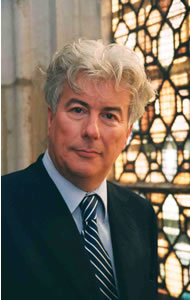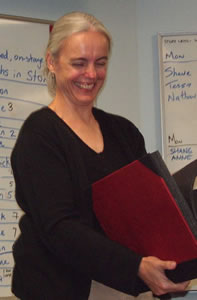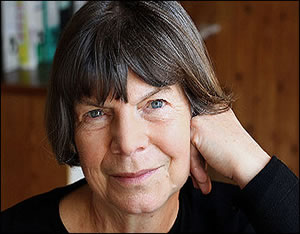De Spaanse dichter en toneelschrijver Federico Garcia Lorca werd geboren op 5 juni 1898 in Fuente Vaqueros, Granada. Zie ook alle tags voor Federico Garcia Lorca op dit blog.
SINT RAFAEL (Córdoba)
Voor Juan Izquierdo Croselles
I
Gesloten koetsen kwamen
aan de oevers vol biezen
waar de golven een naakte
Romeinse torso polijsten.
Koetsen die de Guadalquivir
op zijn rijp kristal
tussen bloemblaadjes
en wolkenklanken spreidt.
De kinderen weven een lied
over wereldse ontgoocheling
bij de oude koetsen
verloren in de nocturne.
Maar Córdoba trilt niet
onder het vage mysterie:
als de schaduw het gebouw
van de rook optrekt,
stut een marmeren voet
zijn kuise en schrale glans.
Bloemblaadjes van slap blik
borduren de zuivergrijze
tinten van de bries als een sprei
over de triomfbogen.
En terwijl de brug
tien Neptunuszuchten slaakt,
vluchten tabakventers
door de vervallen muur.
II
Een enkele vis in het water
dat de twee Córdobas verbindt:
Blank Córdoba van riet.
Córdoba van gebouwen.
Op de oever doen kinderen
onbewogen hun kleren uit,
leerjongens van Tobias
en Merlijnen in hun middel,
ze verstoren de vis
en vragen ironisch
wat hij verkiest: wijnbloemen
of maansikkelsalto’s.
Maar de vis die het water verguldt
en het marmer in rouw dompelt,
leert hen de les en het evenwicht
van een eenzame zuil.
De Aartsengel met donkere
Spaanse en Moorse pailletten,
zocht in de woelige golven
gefluister en bakermat.
Een enkele vis in het water.
Twee Córdobas van schoonheid.
Córdoba gebroken in stralen.
Hemels schraal Córdoba.
Vertaald door Lepus
Weg
Honderd rouwende ruiters,
waarheen gaan ze
door de neergevallen hemel
van de sinaasappelgaard?
Nooit bereiken ze
Cordoba of Sevilla.
En ook Granada niet, dat smacht
naar zee.
Die doezelige paarden
voeren hen mee
naar het labyrint van de kruisen
waar het lied huivert.
Waarheen gaan ze,
met zeven kreten in hun lijf gespijkerd,
de honderd Andalusische ruiters
van de sinaasappelgaard?
Vertaald door Bart Vonck
Gacela der überraschenden Liebe
Niemand begriff den dunklen Magnolien-
duft deines Bauches.
Niemand wußte, daß du zwischen den Zähnen
einen Kolibri der Liebe zu Tode quältest.
Tausend persische Pferdchen schliefen
auf dem Platz im Mondlicht deiner Stirn,
während ich vier Nächte lang deine
Taille, Feindin des Schnees, umschlungen hielt.
Zwischen Gips und Jasmin war dein Blick
ein blasser Zweig mit Samen.
Ich suchte, als Gabe für dich, in meiner Brust
die Elfenbeinbuchstaben, die ewig, ewig,
ewig bedeuten: Garten meiner Qual,
dein Körper für immer flüchtig,
das Blut aus deinen Adern in meinem Mund,
dein Mund schon lichtlos zu meinem Tode.
Vertaald door Johannes Beilharz

Federico García Lorca (5 juni 1898 – 19 augustus 1936), Standbeeld in Madrid
De Nederlandse dichter en schrijver Adriaan Morriën werd geboren op 5 juni 1912 in Amsterdam. Zie ook alle tags voor Adriaan Morriën op dit blog.
Ochtend
De dag ontvangt mij met zijn zichtbaarheid.
De bomen staan in een nadrukkelijk licht.
Ik zie de bladeren afzonderlijk
en tussen hen fragmenten van de lucht.
Ik voel hoe mijn zelfstandigheid verloren gaat
en dat er nauwelijks verschil bestaat
tussen mijn ogen en het licht.
Ars Poetica
De dichter kent geen geheimen
waarover hij iets weet te zeggen
dat niet een woordspeling is,
het tijdverdrijf van zijn regels
Hij kiest uit een taal vol tekens
de tekens die stilte verbreiden:
zijn woord, uit stilte genomen,
keert tot de stilte terug.
Hij oefent zich in het zwijgen,
een tegenstrijdige zanger,
en zingt overstelpt door geluiden
een letterlijk lied aan de stilte.
Afscheid
Zul je voorzichtig zijn?
Ik weet wel dat je maar een boodschap doet
hier om de hoek
en dat je niet gekleed bent voor een lange reis.
Je kus is licht,
je blik gerust
en vredig zijn je hand en voet.
Maar achter deze hoek
een werelddeel,
achter dit ogenblik
een zee van tijd.
Zul je voorzichtig zijn?

De Engelse schrijver Ken Follett werd geboren op 5 juni 1949 in Cardiff, Wales. Zie ook alle tags voor Ken Follett op dit blog.
Uit: The Hammer of Eden
„A man called Priest pulled his cowboy hat down at the front and peered across the flat, dusty desert of South Texas.
The low dull green bushes of thorny mesquite and sagebrush stretched in every direction as far as he could see. In front of him, a ridged and rutted track ten feet wide had been driven through the vegetation. These tracks were called senderos by the Hispanic bulldozer drivers who cut them in brutally straight lines. On one side, at precise fifty-yard intervals, bright pink plastic marker flags fluttered on short wire poles. A truck moved slowly along the sendero.
Priest had to steal the truck.
He had stolen his first vehicle at the age of eleven, a brand-new snow white 1961 Lincoln Continental parked, with the keys in the dash, outside the Roxy Theatre on South Broadway in Los Angeles. Priest, who was called Ricky in those days, could hardly see over the steering wheel. He had been so scared he almost wet himself, but he drove it ten blocks and handed the keys proudly to Jimmy “Pigface” Riley, who gave him five bucks, then took his girl for a drive and crashed the car on the Pacific Coast Highway. That was how Ricky became a member of the Pigface Gang.
But this truck was not just a vehicle.
As he watched, the powerful machinery behind the driver’s cabin slowly lowered a massive steel plate, six feet square, to the ground. There was a pause, then he heard a low-pitched rumble. A cloud of dust rose around the truck as the plate began to pound the earth rhythmically. He felt the ground shake beneath his feet.
This was a seismic vibrator, a machine for sending shock waves through the earth’s crust. Priest had never had much education, except in stealing cars, but he was the smartest person he had ever met, and he understood how the vibrator worked. It was similar to radar and sonar. The shock waves were reflected off features in the earth–such as rock or liquid–and they bounced back to the surface, where they were picked up by listening devices called geophones, or jugs“.

De Amerikaanse schrijfster Kristin Carlson Gore werd geboren op 5 juni 1977 in Carthage, Tennessee Zie ook alle tags voor Kristin Gore op dit blog.
Uit: Sammy’s Hill
„The party really started to rock when Willie Nelson and Queen Nefertiti began pouring shots. I downed one and felt my stomach immediately replaced by a large liquor bonfire that spread through my chest, its flames licking up the inside of my throat. Willie leaned over and whispered that Winnie the Pooh had the hots for me. No way! I loved that guy! As I watched Winnie get down on the dance floor, throwing smoldering Pooh Bear glances in my direction, I all of a sudden felt myself floating. Flapping my arms, I rose higher and higher. Soon I was at thirty thousand feet, and a bit chilly. I plucked the edge of the cloud nearest me and draped it over my shoulders, fashioning a cumulus-nimbus pashmina. Feeling quite stylish, I surveyed the landscape below. I checked in with the mountain ranges, the vast oceans, the tiny cities, the-
“… exceptionally long lines at the gas station. Congressman Francis, do you expect some sort of bailout package for Exxon?”
NPR’s Morning Edition crackled into my consciousness to remind me that I was not a party-hopping sorceress but rather a Capitol Hill staffer who only had twenty minutes to get to work.
Huh. If I didn’t do shots with Willie Nelson and Nefertiti, then why did I feel hungover?A brief glance into the kitchen brought it all back. Right, the bottle of wine from the ninety-nine-cent store. It had seemed like such a good deal at the time.
Okay, twenty minutes. Considering I was supposed to meditate for thirty, I’d have to postpone that until later. I’d also have to delay the fifteen-minute stomach crunch set, the do-it-yourself manicure, and the new dictionary word for the day. I promised myself I’d get to all that, but I knew I was lying. In reality, I would crawl home after working late, feeling too exhausted to do anything but maybe test out some ninety-nine-cent tequila.
But it was way too early in the day for such cynicism. As my dad always said, anything and everything is possible in the morning.
I’d never been a morning person.“

Kristin Gore (Carthage, 5 juni 1977)
De Australische schrijfster Margo Lanagan werd geboren op 5 juni 1960 in Waratah, New South Wales. Veel van haar boeken verschenen alleen in Australië. Een aantal van haar boeken trok echter wereldwijde aandacht. Haar verhalenbundel Black Juice won twee World Fantasy Awards en een 2006 Printz Honor Award. De bundel bevat ook het in veel bloemlezingen opgenomen korte verhaal “Singing My Sister Down.”
Uit: Tender Morsels
„Liga’s father fiddled with the fire, fiddled and fiddled. Then he stood up, very suddenly.
“I will fetch more wood.”
What’s he angry about? Liga wondered. Or worried, or something. He is being very odd.
Snow-light rushed in, chilling the house. Then he clamped the door closed and it was cozy again, cozy and empty of him. Liga took a deep private breath then blew it out, slowly. Just these few moments would be her own.
But her next breath caught rough in her throat. She opened her eyes. Gray smoke was cauliflowering out of the fireplace, fogging the air. The smell! What unnamable rubbish had fallen in the fire?
She coughed so hard she must put aside the rush mat she was binding the edge of and give her whole body over to the coughing. Then pain caught her, low, and folded her just like a rush-stalk, it felt, in a line across her belly, crushing her innards. She could hardly get breath to cough. Sparks that were not from the fire jiggled and swam in her eyes—she could not see the fire for the smoke. She could not believe what she was feeling.
The pain eased just as abruptly. It let her get up. It gave her a moment to stagger to the door and open it, her insides dangerous, liquid, hot with surprise and readying to spasm again.
Her father was halfway back from the woodpile, his arms full. He bared his teeth at her, no less. “What you doing out?” White puffs came with the words. “Get back inside. Who said you could come out?”
“I cannot breathe in there.” The cold air dived down her throat and she coughed again.
“Then go in and don’t breathe! Shut the door—you’re letting the smoke out. You’re letting the heat.” He dropped the wood in the snow.“

Margo Lanagan (Waratah, 5 juni 1960)
De Engelse schrijfster Margaret Drabble werd geboren op 5 juni 1939 in Sheffield, Yorkshire. Zie ook alle tags voor Margaret Drabble op dit blog.
Uit: The Pattern in the Carpet
„I had recently finished a novel, which I intended to be my last, in which I believed myself to have achieved a state of calm and equilibrium. I was pleased with The Sea Lady and at peace with the world. It had been well understood by those whose judgement I most value, and I had said what I wanted to say. I liked the idea of writing something that would take me away from fiction into a primary world of facts and pictures, and I envisaged a brightly coloured illustrated book, glinting temptingly from the shelves of gallery and museum shops amongst the greetings cards, mugs and calendars portraying images from Van Gogh and Monet. It would make a pleasing Christmas present, packed with gems of esoteric information that I would gather, magpie-like, from libraries and toy museums and conversations with strangers. I would become a jigsaw expert. It would fill my time pleasantly, inoffensively. I didn’t think anyone had done it before. I would write a harmless little book that, unlike two of my later novels, would not upset or annoy anybody.
It didn’t work out like that.
Not long after I conceived of this project, my husband Michael Holroyd was diagnosed with an advanced form of cancer and we entered a regime of radiotherapy and chemotherapy all too familiar to many of our age. He endured two major operations of hitherto unimagined horror, and our way of life changed. He dealt with this with his usual appearance of detachment and stoicism, but as the months went by I felt myself sinking deep into the paranoia and depression from which I thought I had at last, with the help of the sea lady, emerged. I was at the mercy of ill thoughts.
Some of my usual resources for outwitting them, such as taking long solitary walks in the country, were not easily available. I couldn’t concentrate much on reading, and television bored me, though DVDs, rented from a film club recommended by my sister Helen, were a help. We were more or less housebound, as we were told to avoid public places because Michael’s immune system was weak, and I was afraid of poisoning him, for he was restricted to an unlikely diet consisting largely of white fish, white bread and mashed potato.

Margaret Drabble (Sheffield, 5 juni 1939)
Zie voor nog meer schrijvers van de 5e juni ook mijn vorige blog van vandaag.









